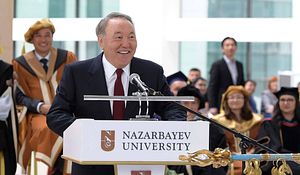With a government decree, Kazakhstan’s Astana International Airport was renamed after Nursultan Nazarbayev, the country’s president since independence, in a move that confirms common perceptions of an unwavering cult of personality.
While naming airports and other national landmarks after president is not uncommon – from JFK in New York to Charles De Gaulle in Paris – giving one the name of a sitting president is undoubtedly rarer. Even in Uzbekistan, where former President Islam Karimov cultivated his own personality cult, the government gave the airport in Tashkent Karimov’s name only in January 2017, a few months after his death. When airports are dedicated to people still active in their profession – as it happened with footballer Cristiano Ronaldo International Airport in Madeira, Portugal – analysts often question the decisions as premature.
In this case, the decision was welcomed by several politicians who somewhat represent Nazarbayev’s “fan base.” They call him “Yelbasy,” father of the nation, with endearment and would rename anything in his honor, if possible.
Bakytgul Khamenova, MP for the ruling Nur Otan party, said she will continue to lobby for renaming Astana after Nazarbayev. In 1997, when it became the country’s capital, the government changed the name of the city from Tselinograd to Astana, “capital” in Kazakh. Locals often speculate that the generic name could just be a placeholder and that the city will be renamed after Nazarbayev once he is no longer in power.
In the meantime, however, the number of applications of the Nazarbayev brand to institutions and landmarks is surpassing the rumors circulating on social media and on the streets over the past few years.
Soon after it was opened in 2009, the New University of Astana was renamed Nazarbayev University. A network of elite-grade schools was also established under the name Nazarbayev Intellectual Schools. In celebration of Kazakhstan’s 25th year of independence, the Central Bank printed a limited edition 10,000 tenge banknote featuring Nazarbayev’s portrait. Since July 2010, residents of Almaty, the former capital, can take a stroll in the Park of the First President, which features a large statue of Nazarbayev. Despite the president’s repeated declarations that such showings of reverence are excessive, his closest circle continues to crown him with laurels.
The idea of dedicating the Astana airport to Nazarbayev was lodged in 2009, followed by a public survey ordered by the Senate. Nazarbayev’s resistance to this latest accolade seems to have finally given in. As if foreseeing a scolding from above, Dauren Abayev, minister for information and communication, said he hoped “that the president would understand this as a celebration of his legacy for the improvement of Kazakhstan’s infrastructure.”
In a similar tone, Yerlan Karin, a political analyst recently appointed head of Kazakhstan TV, said the decision could find a rationale in the president’s recent policies to improve infrastructure in the country.
“It is a logical move because our president was behind “Nurly Zhol,” one of the most successful government program for the development of transport infrastructure,” he told local media.
Asked about the news of the airport’s new name, a local NGO worker in Almaty who often travels to Astana Airport said the change is unlikely to affect anyone in Kazakhstan, as long as services continue to improve.
“I don’t care about the name of the airport, I care about its services, its facilities and its connections. Naming it after the president highlights once again the cult of personality that permeates Astana, but I think this is a non-issue for local everyday users of the hub, as long as standards are kept high,” she told The Diplomat.
Importantly, the decision to rename the airport came from a government decree and is independent from the private company Astana International Airport that manages the hub. Furthermore, the airport is likely to retain its International Air Transport Association (IATA) code, TSE, which will continue to remind passengers that, after all, there are no permanent names in Kazakhstan’s never-ending transition.
































